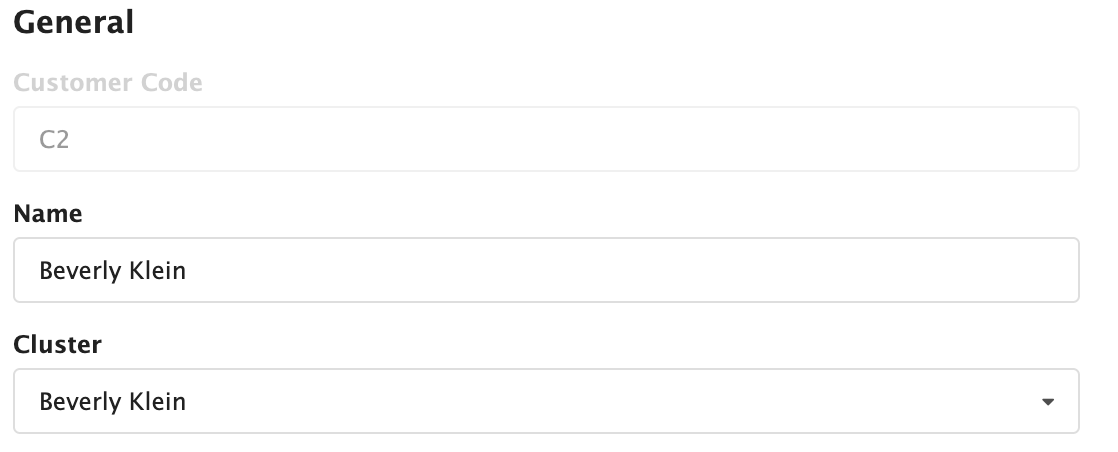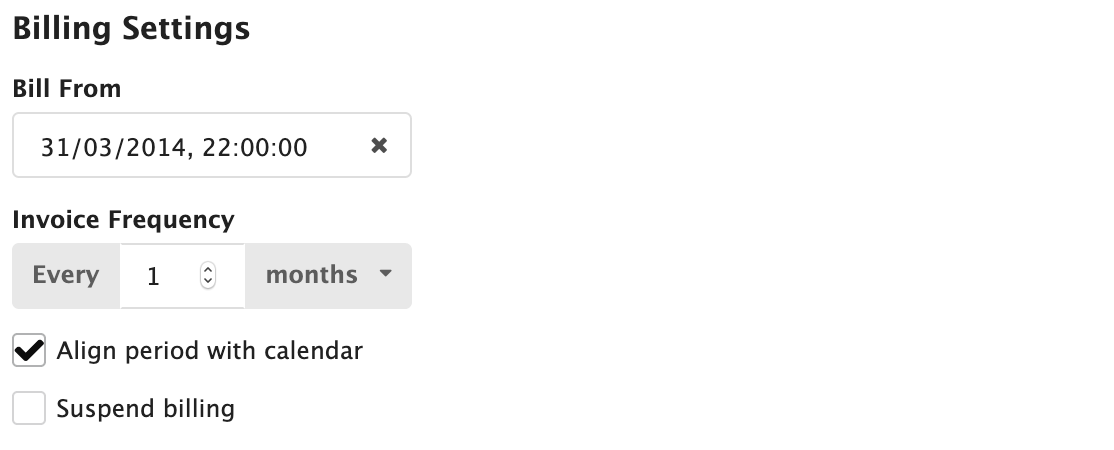Add / Edit a Customer
The Add / Edit Customer screen is divided into multiple parts.
General

These fields are required properties of a customer, they should always be filled.
- Customer Code - The Customer Code must be unique, as it is used as the identifier of the Customer within CloudBilling. It can consist of any combination of numbers, letters or special characters.
- Important: once saved, the Customer Code of a Customer can no longer be edited or changed.
- Name- The Customer Name does not have to be unique.
- Cluster - The Cluster field is the Customer Cluster you want to link this specific Customer to. The cluster has to exist in the CloudBilling system.
Billing Settings

These settings determine how a customer is invoiced.
- Bill From - The date at which the first invoice for this customer should begin. Unless Align period with calendar is enabled, see below. Once an invoice exists for the customer, this setting no longer has any effect.
- Invoice Frequency - How often the customer should receive an invoice. For example: Every 2 months.
- Align period with calendar - Whether the invoice period should be aligned to a calendar period. If enabled, the start of the invoice will align with the start of the calendar period. So the first of the month for a month, midnight for a day, and January 1st for a year.
- Suspend Billing - If a customer’s billing is suspended, no calculation will occur for the customer and no invoices will be generated for the customer.
Contact Person

- Name - The Contact Person Name can be placed on this Customer’s invoice or used for CRM purposes.
- Phone - The Contact Phone can be used to store the Customer’s or Contact Person’s phone number for CRM purposes.
Localisation

- Time Zone - The time zone setting is not required. The field will default to what is configured in the Environment Settings.
- Language Code - The Language Code can be used to determine the language used on the invoices for this Customer. Please note that different invoice languages must be supported by the invoice template used in your environment.
Addresses

Multiple addresses can be added to a customer. These addresses all have a name which serves as an identifier. A customer could, for example, have an Invoice Address which is used for display purposes on the PDF that CloudBilling generates.
E-mail Addresses

Similar to addresses, multiple e-mail addresses can be added to a customer. An e-mail address consists of 3 properties:
- Key - An identifier for the e-mail address to use in other parts of the system.
- E-mail Address - The actual e-mail address.
- Display Name - The name to show in e-mail clients.
Metadata

Additional information can be added to a customer in the form of metadata. All metadata consists of 3 elements: a type, a key, and a value. The type can be a Date, a Number, or Text. The key can be any string and the value can be anything of the specified type. This metadata can be used in pricing rules, on the invoice, and in e-mails.
Bundles

This section is only visible if the customer in question has any bundles associated with them. If this is the case, an overview of the customer’s bundles will be displayed along with a history of usage registered against the bundle in different periods.
Note: updating a Customer might affect the calculation of associated current invoices. For this reason, CloudBilling will automatically determine which invoices are potentially affected and queue them for recalculation (Reject the invoices).